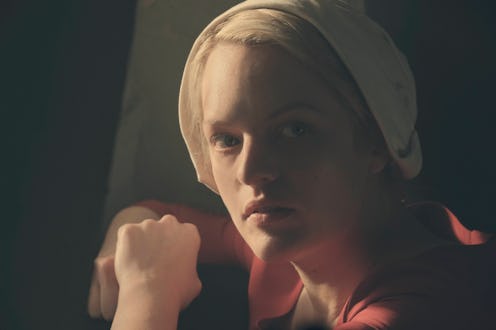
Since its premiere in April, many have drawn parallels between The Handmaid's Tale and 2017. The Hollywood Reporter hailed it as "unintentionally relevant," USA Today a "wake-up call for women," and Rolling Stone a "chilling Trump-era series." Even when its premiere was announced back in December, people joked that by the time it aired, it would play more like a documentary than a TV show.
Five months later it is, of course, still fiction, but as the series continues to unfold, its real-life resonance has only intensified. Thematically, it's most directly tied to the ongoing fight for women's body autonomy, but it also broaches topics of sexual assault, climate change, and governmental tyranny. Based on Margaret Atwood's classic 1985 novel, it stars Elisabeth Moss as Offred, a surrogate slave thrust into a hellish dystopia where women are powerless and men rule supreme.
The book has, in some ways, always been timely, but in the wake of Donald Trump's election, it carries newfound prescience. What began as an adaptation of a haunting '80s parable has fast become one of the most important shows on television, imagining what could happen should religious extremism and misogyny revert our liberal democracy into a patriarchal regime.
1. It Mirrors The War On Reproductive Rights
Perhaps the most striking — and oft-cited — parallel between The Handmaid's Tale and 2017 is at the very core of the show's premise. In Gilead, fertile women are stripped of their most basic rights and seized as surrogate slaves — their only purpose in life reduced to their ability to bear children for men. And as we continue to push for the right to choose, it serves as a chilling admonition for what could happen when women lose ownership of their lives and bodies.
2. It Reflects The Dangers Of Climate Change
Also at the crux of The Handmaid's Tale is an increasingly eroding environment — a detail that aptly echoes the issue of climate change we currently face. Gilead uses this to justify its twisted hierarchy: with much of the world rendered infertile, repopulation becomes law. According to The Atlantic, there have been studies that show pollution can affect fertility, though likely not to this extreme, but it's an unsettling analogy nonetheless.
3. It Tackles Modern Prejudice
The Handmaid's Tale intentionally removed the race element present in Atwood's original story, but it does explore other biases like sexism and LGBTQ intolerance. Despite its purported adherence to biblical values, Gilead is actually a guise for a brutal patriarchy. It gives power to men, dehumanizes women, and attempts to "fix" gay people through mutilation. In real life, we've made many strides in the fight for equality for women and members of the LGBTQ community, but bigotry certainly persists, and in Handmaid's Tale, its harshest realities are on full display.
4. It Stresses The Importance Of Sexual Consent
The Handmaid's Tale's fifth episode, "Faithful," includes a particularly incisive demonstration of the difference between consensual and non-consensual sex. In one scene, protagonist Offred is forced to have intercourse with her commander during Gilead's mandated impregnation ceremony; In another, she actively chooses to have sex with her driver, Nick. Both are wordless exchanges, putting them squarely in the gray area at the center of the ongoing conversation around sexual assault, but Handmaid's Tale makes its boundaries clear: when it comes to consent, the stretch between "yes" and "no" isn't complicated.
5. It Speaks To Conservative Women
One of the story's most controversial figures is the commander's wife, Serena Joy, a former televangelist who quite literally wrote herself out of her own fate. Before Gilead, she helped her husband design the oppressive, antiquated society she now finds herself in, except here, her power has been revoked. It plays much like a cautionary tale to real-life conservative women, whose ideals often hinder the freedoms of other women.
6. It Addresses The Threat Of Autocracy
From his repeated dismissal of credible, corroborated facts to his increasingly adversarial relationship with essential democratic institutions like the courts and media, Donald Trump has ignited many concerns about his seemingly authoritarian approach to governing. The Handmaid's Tale sets these fears to an extreme, imagining a totalitarian dystopia in which public dissent is punishable by death. It's not a direct comparison, but it's still plenty distressing.
7. It Warns Against Inaction
One of the biggest pleas from Trump's opponents has been to pick ourselves up in the face of defeat — to not merely survive the next four years, but to stay active and vigilant in politics. The Handmaid's Tale champions a similar message, doing well to emphasize how it was not a sudden overthrow that did them in, but a million tiny, built-up infractions that slowly grew into a full-blown affront on freedom.
If you haven't yet begun to watch The Handmaid's Tale, start now — these are just seven of the many reasons why it's worth the screen time.